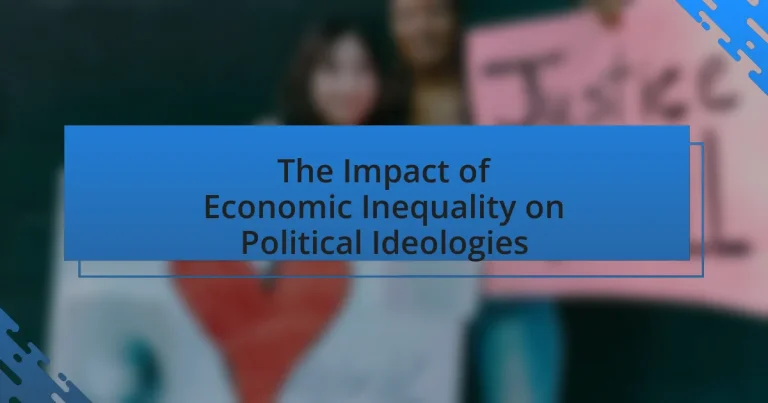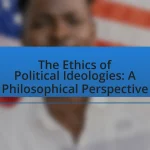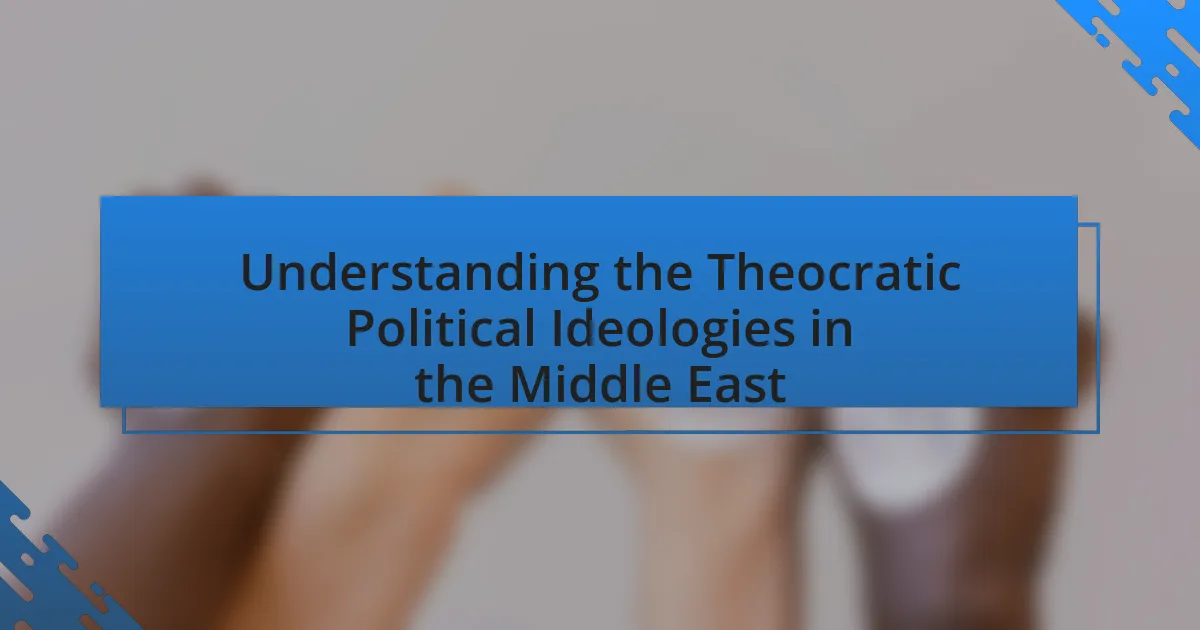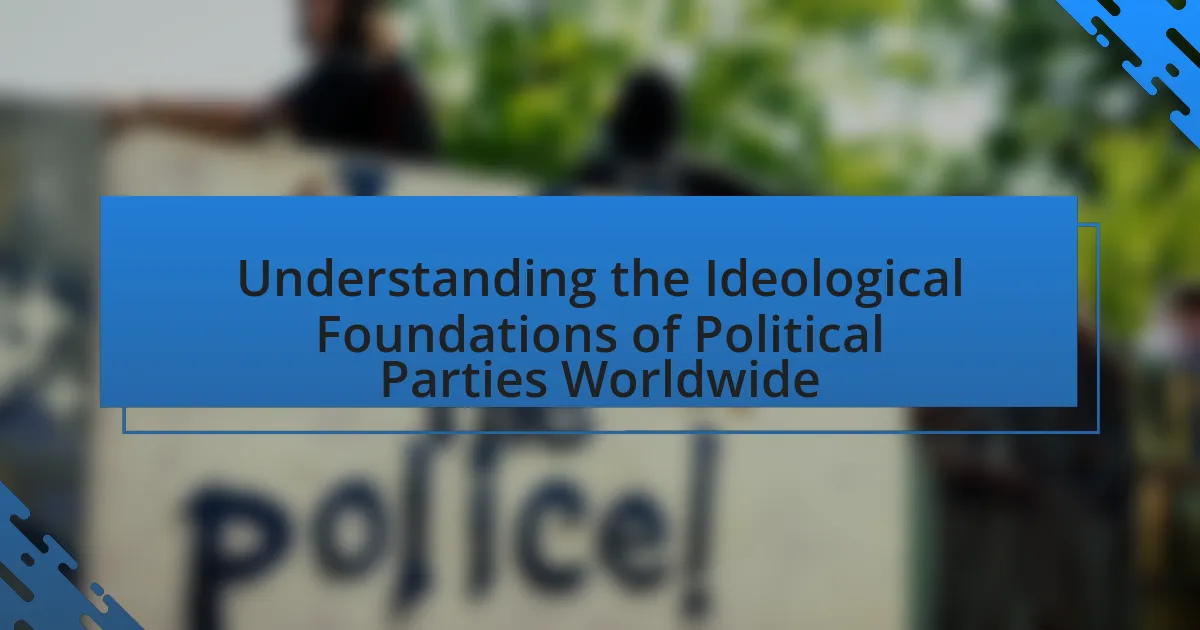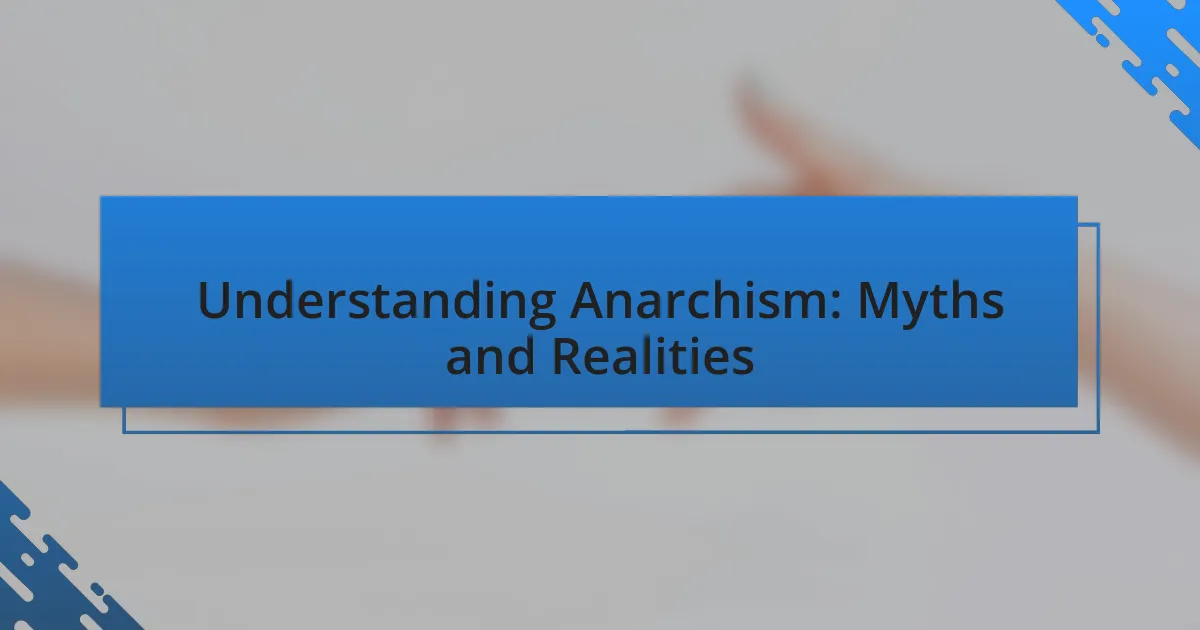The article examines the relationship between economic inequality and political ideologies, highlighting how disparities in wealth influence individual beliefs and broader political landscapes. It discusses how higher economic inequality often leads to the rise of populist movements and political polarization, with wealthier individuals favoring conservative ideologies while lower-income groups lean towards progressive policies advocating for social justice. Key factors linking economic inequality to political ideologies include class interests, perceptions of social mobility, and policy preferences. The article also explores how different political ideologies respond to economic inequality, the implications for democratic processes, and the potential reforms that can bridge the gap between economic disparities and political engagement.
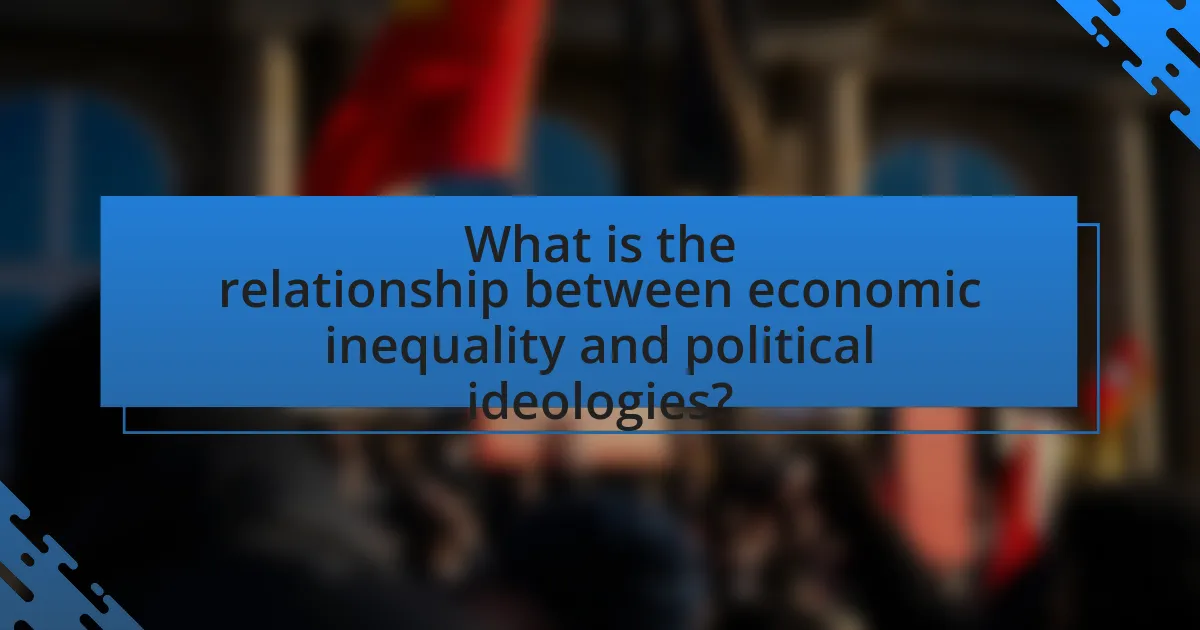
What is the relationship between economic inequality and political ideologies?
Economic inequality significantly influences political ideologies, shaping the beliefs and policies of individuals and groups. Higher levels of economic inequality often lead to the emergence of populist movements, as marginalized populations seek representation and advocate for wealth redistribution. For instance, research by Piketty in “Capital in the Twenty-First Century” highlights how economic disparities can foster political polarization, with wealthier individuals leaning towards conservative ideologies that favor maintaining the status quo, while lower-income groups gravitate towards progressive ideologies advocating for social justice and economic reforms. This dynamic illustrates that economic inequality not only affects individual political preferences but also alters the broader political landscape, leading to shifts in party platforms and electoral outcomes.
How does economic inequality influence political beliefs?
Economic inequality significantly influences political beliefs by shaping individuals’ perceptions of fairness, opportunity, and government responsibility. Research indicates that higher levels of economic inequality correlate with increased support for conservative policies among wealthier individuals, who may prioritize tax cuts and deregulation, while lower-income individuals often lean towards progressive policies that advocate for social welfare and wealth redistribution. A study by the Pew Research Center found that economic disparities can lead to polarized political views, as those in lower economic strata feel marginalized and advocate for systemic change, while those in higher strata may resist such changes to protect their interests. This dynamic illustrates how economic inequality not only affects individual political preferences but also contributes to broader ideological divides within society.
What are the key factors linking economic inequality to political ideologies?
Economic inequality significantly influences political ideologies through factors such as class interests, social mobility perceptions, and policy preferences. Class interests dictate that wealthier individuals often support policies favoring their economic status, while lower-income groups advocate for redistribution and social welfare. Research indicates that societies with high economic inequality tend to foster political polarization, as individuals align with ideologies that reflect their economic circumstances. For instance, a study by Piketty in “Capital in the Twenty-First Century” highlights how economic disparities can lead to divergent political beliefs, with wealth concentration correlating to conservative ideologies that resist wealth redistribution. Additionally, perceptions of social mobility affect political engagement; when individuals believe they have limited opportunities to improve their economic status, they may gravitate towards ideologies that promise systemic change. Thus, the interplay of class interests, social mobility perceptions, and policy preferences forms a critical link between economic inequality and political ideologies.
How do different political ideologies respond to economic inequality?
Different political ideologies respond to economic inequality in distinct ways, reflecting their foundational beliefs and values. For instance, liberalism typically advocates for government intervention to reduce inequality through progressive taxation and social welfare programs, aiming to create a more equitable society. In contrast, conservatism often emphasizes individual responsibility and free-market principles, arguing that economic inequality is a natural outcome of differing abilities and efforts, thus resisting extensive government intervention. Socialism, on the other hand, directly challenges economic inequality by promoting collective ownership and wealth redistribution, seeking to eliminate class distinctions. Empirical evidence supports these ideological responses; for example, countries with strong social welfare systems, like the Nordic nations, exhibit lower levels of economic inequality compared to those with minimal intervention, such as the United States.
Why is understanding this relationship important?
Understanding the relationship between economic inequality and political ideologies is crucial because it influences policy-making and social cohesion. Economic inequality can lead to divergent political beliefs, where the affluent may prioritize free-market policies while the disadvantaged advocate for social welfare programs. Research by Piketty in “Capital in the Twenty-First Century” highlights that rising inequality can destabilize democracies, as it fosters discontent among lower-income groups, potentially leading to political polarization. This polarization can hinder effective governance and exacerbate social tensions, making it essential to comprehend how economic disparities shape political landscapes.
What implications does economic inequality have on democratic processes?
Economic inequality undermines democratic processes by creating disparities in political influence and access to resources. When wealth is concentrated in the hands of a few, those individuals or groups can exert disproportionate influence over political decisions, often prioritizing their interests over the common good. For instance, research by Gilens and Page (2014) in “Testing Theories of American Politics: Elites, Interest Groups, and Average Citizens” demonstrates that economic elites have significantly more influence on policy outcomes than average citizens, leading to a political system that favors the wealthy. This dynamic can result in voter disenfranchisement, reduced civic engagement, and policies that exacerbate inequality, ultimately threatening the foundational principles of democracy.
How can economic inequality shape public policy decisions?
Economic inequality can significantly shape public policy decisions by influencing the priorities and preferences of policymakers and the electorate. When wealth is concentrated in the hands of a few, those individuals or groups often have greater political influence, which can lead to policies that favor their interests, such as tax cuts for the wealthy or reduced regulations on businesses. For instance, research by the Institute on Taxation and Economic Policy shows that states with higher income inequality tend to have lower tax rates on the wealthy, reflecting the interests of affluent constituents. Additionally, economic inequality can lead to social unrest and demands for reform, prompting policymakers to address disparities through social programs or progressive taxation. This dynamic illustrates how economic inequality not only affects individual lives but also shapes the broader political landscape and policy outcomes.
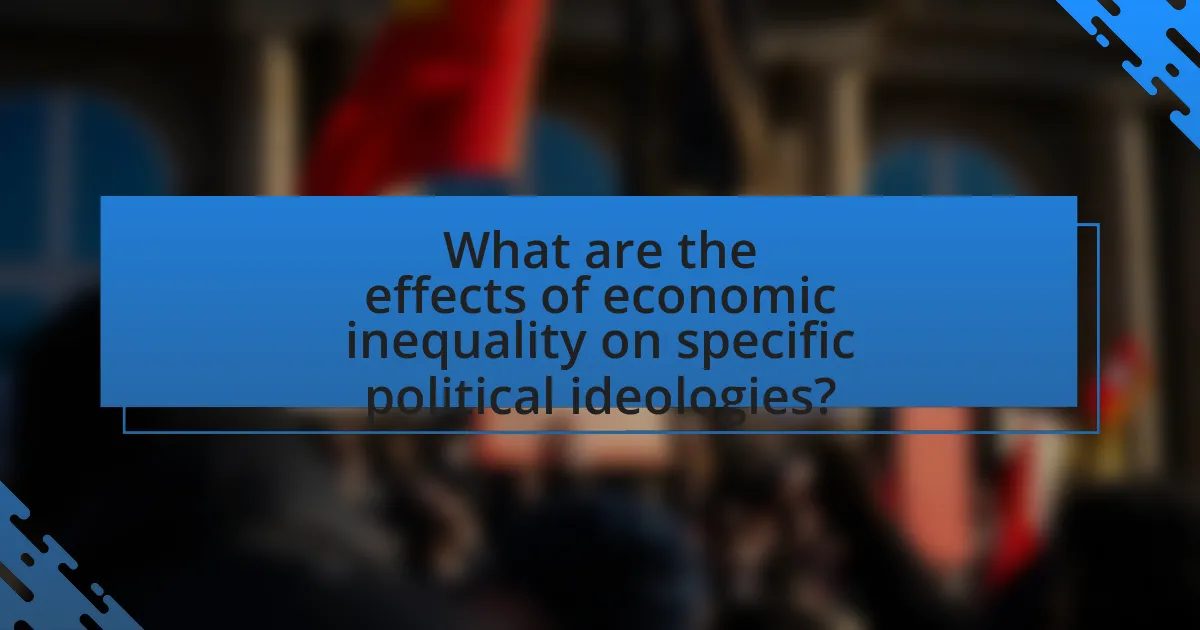
What are the effects of economic inequality on specific political ideologies?
Economic inequality significantly influences political ideologies by shaping the priorities and beliefs of different groups. For instance, in societies with high economic inequality, leftist ideologies often gain traction as they advocate for wealth redistribution and social justice, aiming to address disparities. Conversely, right-leaning ideologies may emphasize individualism and free-market principles, arguing that economic inequality is a natural outcome of competition and innovation.
Research indicates that countries with greater economic inequality tend to experience increased support for populist movements, which can disrupt traditional political alignments. A study by Piketty in “Capital in the Twenty-First Century” highlights how rising inequality can lead to political polarization, as wealth concentration often results in the affluent exerting disproportionate influence over policy-making, thereby undermining democratic processes.
Moreover, economic inequality can foster disillusionment with the political system, leading to lower voter turnout among disadvantaged groups, which further entrenches existing power dynamics. This cycle reinforces the ideologies that benefit the wealthy, while leftist movements struggle to gain traction without broad-based support.
How does economic inequality affect liberal ideologies?
Economic inequality significantly influences liberal ideologies by challenging the core principles of equality and social justice that underpin them. As economic disparities widen, liberal ideologies often shift towards advocating for more robust government intervention and social welfare programs to address the needs of marginalized populations. For instance, research by the Pew Research Center indicates that rising income inequality correlates with increased public support for policies aimed at wealth redistribution, such as higher taxes on the wealthy and expanded social services. This shift reflects a fundamental tension within liberal thought, as economic inequality undermines the belief in equal opportunity and can lead to a perception of systemic injustice, prompting calls for reform and greater equity in society.
What policies do liberals advocate in response to economic inequality?
Liberals advocate for progressive taxation, increased minimum wage, and expanded social safety nets as policies to address economic inequality. Progressive taxation aims to reduce income disparity by taxing higher incomes at increased rates, which can fund public services and welfare programs. For instance, the Tax Policy Center reports that a progressive tax system can significantly decrease the wealth gap by redistributing resources. Increasing the minimum wage is another key policy, as studies, including those from the Economic Policy Institute, show that raising the minimum wage can lift many workers out of poverty and stimulate economic growth. Additionally, expanding social safety nets, such as healthcare and unemployment benefits, provides essential support to low-income individuals, thereby reducing economic disparities.
How do liberal ideologies perceive the role of government in addressing inequality?
Liberal ideologies perceive the role of government as essential in addressing inequality through active intervention and policy-making. Liberals advocate for government measures such as progressive taxation, social welfare programs, and regulations that promote equal opportunities, aiming to reduce disparities in wealth and access to resources. Historical evidence, such as the implementation of the New Deal in the 1930s, illustrates how government action can effectively mitigate economic inequality by providing support to disadvantaged groups and stimulating economic growth.
What impact does economic inequality have on conservative ideologies?
Economic inequality significantly influences conservative ideologies by reinforcing beliefs in individualism and meritocracy. Conservatives often argue that economic disparities reflect personal choices and abilities, leading to a preference for limited government intervention in wealth redistribution. This perspective is supported by studies indicating that higher levels of economic inequality correlate with increased support for conservative policies, as individuals perceive their economic status as a result of their own efforts rather than systemic factors. For instance, research from the Pew Research Center shows that in societies with greater income inequality, individuals are more likely to endorse conservative values that emphasize personal responsibility and self-reliance.
How do conservatives view economic inequality in relation to personal responsibility?
Conservatives generally view economic inequality as a result of individual choices and personal responsibility. They argue that individuals have the agency to improve their economic situation through hard work, education, and entrepreneurship. This perspective is supported by the belief that success is attainable for those who are willing to put in the effort, as evidenced by the American Dream narrative, which emphasizes meritocracy and self-determination. Consequently, conservatives often see government intervention aimed at reducing inequality as counterproductive, believing it undermines personal accountability and the incentive to strive for success.
What solutions do conservatives propose for economic inequality?
Conservatives propose several solutions for economic inequality, primarily focusing on free-market principles, tax reforms, and reducing government intervention. They advocate for policies that promote economic growth through deregulation and support for small businesses, believing that a thriving economy will create jobs and increase wages. For instance, tax cuts for individuals and corporations are suggested to incentivize investment and spending, which can lead to job creation and higher income levels. Additionally, conservatives often emphasize the importance of education and vocational training to equip individuals with skills necessary for higher-paying jobs, thereby addressing inequality through enhanced opportunities. These approaches are rooted in the belief that empowering individuals and businesses will lead to a more equitable economic landscape.
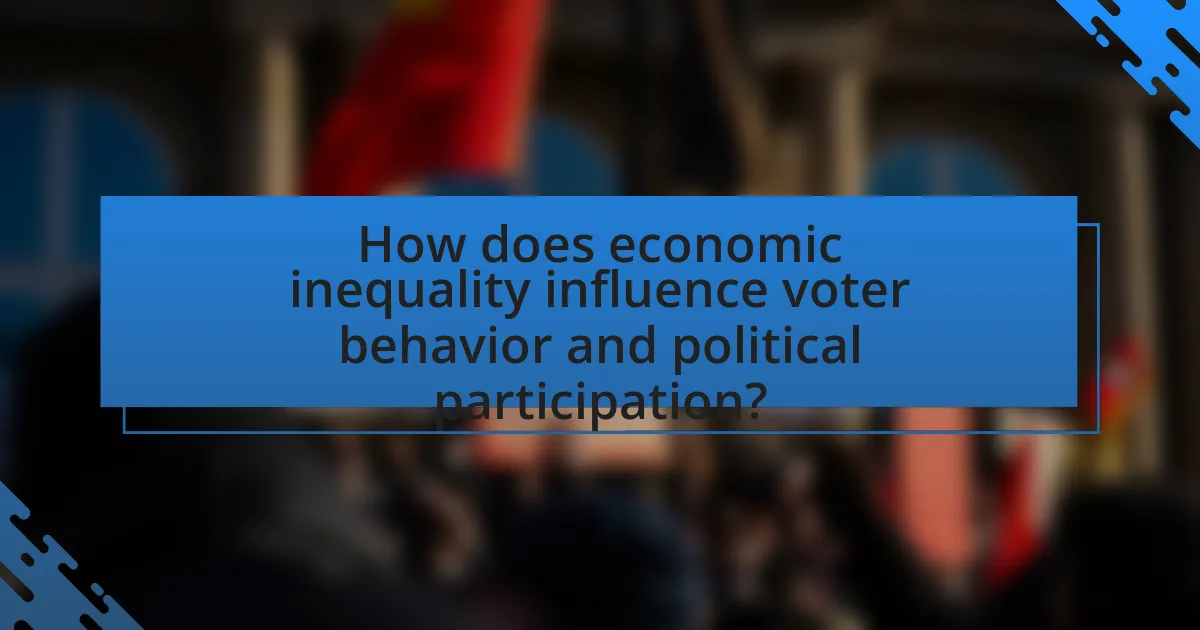
How does economic inequality influence voter behavior and political participation?
Economic inequality significantly influences voter behavior and political participation by creating disparities in political engagement and preferences among different income groups. Individuals from lower economic strata often experience disenfranchisement, leading to lower voter turnout rates compared to their wealthier counterparts. For instance, research by the Pew Research Center indicates that in the 2020 U.S. presidential election, voters with household incomes below $30,000 had a turnout rate of approximately 50%, while those earning over $100,000 had a turnout rate of around 80%. This gap illustrates how economic status can dictate political engagement levels. Furthermore, economic inequality shapes political preferences, as lower-income voters tend to support policies aimed at wealth redistribution, while wealthier individuals often favor tax cuts and deregulation, reflecting their vested interests. This divergence in political priorities can lead to polarized electoral outcomes and influence the overall political landscape.
What role does economic status play in voter turnout?
Economic status significantly influences voter turnout, with individuals from higher economic backgrounds typically exhibiting higher participation rates in elections. Research indicates that wealthier individuals often have greater access to resources such as time, information, and transportation, which facilitate voting. For instance, a study by the U.S. Census Bureau in 2020 revealed that 79% of individuals with a household income above $100,000 voted, compared to only 53% of those earning less than $30,000. This disparity highlights how economic status can create barriers to participation, as lower-income individuals may face challenges such as job obligations or lack of transportation, ultimately affecting their likelihood to vote.
How does economic inequality affect engagement in political processes?
Economic inequality significantly reduces engagement in political processes. Individuals from lower economic strata often feel disenfranchised and believe their voices are not heard, leading to lower voter turnout and participation in civic activities. Research by the Pew Research Center indicates that wealthier individuals are more likely to engage in political activities, such as voting and campaigning, compared to those with lower incomes. This disparity in engagement can perpetuate a cycle where the interests of the affluent are prioritized in policy-making, further entrenching economic inequality.
What barriers do economically disadvantaged groups face in political participation?
Economically disadvantaged groups face significant barriers in political participation, primarily due to financial constraints, lack of access to information, and systemic disenfranchisement. Financial constraints limit their ability to engage in political activities, such as voting, campaigning, or attending political events, as they may prioritize basic needs over civic engagement. Lack of access to information arises from limited educational resources and media exposure, which hinders their understanding of political processes and issues. Systemic disenfranchisement is evident in practices such as voter ID laws and gerrymandering, which disproportionately affect low-income populations. According to a study by the Brennan Center for Justice, states with strict voter ID laws saw a significant decrease in voter turnout among low-income individuals, highlighting the impact of these barriers on political participation.
How can addressing economic inequality lead to changes in political ideologies?
Addressing economic inequality can lead to changes in political ideologies by shifting public perceptions of fairness and justice within society. When economic disparities are reduced, individuals may become more inclined to support policies that promote social welfare and collective responsibility, reflecting a more progressive political ideology. For instance, research by the Pew Research Center indicates that as income inequality decreases, there is a corresponding increase in support for government intervention in the economy and social programs, suggesting a shift towards more left-leaning political beliefs. This transformation occurs because individuals who experience improved economic conditions often advocate for policies that benefit the broader community, thereby influencing the political landscape and encouraging ideologies that prioritize equity and social justice.
What reforms can bridge the gap between economic inequality and political engagement?
Reforms that can bridge the gap between economic inequality and political engagement include implementing progressive taxation, enhancing access to education, and promoting campaign finance reform. Progressive taxation can reduce income disparities, as evidenced by countries like Sweden, where higher tax rates on the wealthy have led to more equitable wealth distribution and increased political participation among lower-income citizens. Enhancing access to education empowers individuals with the knowledge and skills necessary for political engagement, as shown by studies indicating that higher educational attainment correlates with increased voter turnout. Lastly, campaign finance reform can limit the influence of money in politics, ensuring that all voices are heard, which is supported by research from the Brennan Center for Justice, highlighting that reducing the impact of large donations can lead to more equitable political representation.
How can political parties adapt their ideologies to address economic inequality?
Political parties can adapt their ideologies to address economic inequality by incorporating policies that promote wealth redistribution and social welfare. For instance, parties can advocate for progressive taxation, which has been shown to reduce income disparities; countries like Sweden and Denmark have successfully implemented such systems, resulting in lower levels of economic inequality. Additionally, political parties can support universal basic income initiatives, which have gained traction in various regions as a means to provide financial security to all citizens, thereby addressing the root causes of economic disparity. By aligning their platforms with evidence-based solutions that prioritize equity, political parties can effectively respond to the challenges posed by economic inequality.
What practical steps can be taken to mitigate the impact of economic inequality on political ideologies?
To mitigate the impact of economic inequality on political ideologies, implementing progressive taxation is essential. Progressive taxation can reduce income disparities by taxing higher incomes at increased rates, thereby redistributing wealth and funding social programs that benefit lower-income individuals. For instance, countries like Sweden and Denmark have successfully utilized progressive tax systems to maintain lower levels of economic inequality, which correlates with more cohesive political ideologies and social trust. Additionally, enhancing access to quality education and healthcare can empower disadvantaged groups, fostering a more equitable political landscape. Research indicates that improved educational opportunities lead to greater political engagement and informed voting, which can counteract the influence of wealth on political power.
What policies can promote equitable economic growth and political representation?
Policies that can promote equitable economic growth and political representation include progressive taxation, universal access to quality education, and inclusive labor market regulations. Progressive taxation ensures that wealthier individuals contribute a fair share to public resources, which can be reinvested in social programs that benefit lower-income populations. Universal access to quality education equips all individuals with the skills necessary to participate in the economy and engage in political processes, thereby enhancing representation. Inclusive labor market regulations, such as minimum wage laws and protections for workers, help to reduce income disparities and empower marginalized groups to have a voice in political decision-making. These policies are supported by research indicating that countries with higher levels of education and fair labor practices tend to experience more equitable economic growth and improved political representation.
How can grassroots movements influence political ideologies regarding economic inequality?
Grassroots movements can significantly influence political ideologies regarding economic inequality by mobilizing public awareness and advocating for policy changes. These movements often highlight the disparities in wealth and access to resources, which can shift public opinion and pressure policymakers to address economic inequality. For instance, the Occupy Wall Street movement, which emerged in 2011, brought attention to the growing wealth gap in the United States, leading to increased discussions about income inequality in political discourse and influencing the platforms of various political candidates. Research indicates that grassroots activism can lead to legislative changes, as seen in the push for minimum wage increases in several states, reflecting a broader ideological shift towards recognizing and addressing economic disparities.
